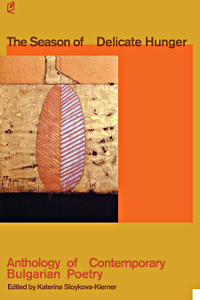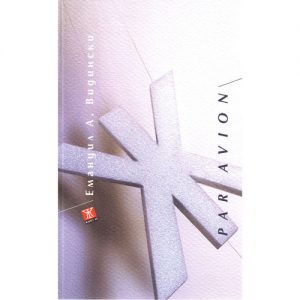Some time ago I introduced the Bulgarian poet Vladislav Hristov here with some examples of his poetic craft. As regular readers of this blog will know already, I take a particular interest in Bulgarian literature and am frequently reviewing books by Bulgarian authors who deserve it to be read also outside their country. In the field of poetry it seems that Bulgaria has an abundance of talents, but the same goes also for the short prose. And with Georgi Gospodinov Bulgaria has now a writer that “plays in the Premier League” of World Literature – when this sporty metaphor is allowed in this context.
Today I want to share a few poems by another poet of the younger generation in Bulgaria: Emanuil A. Vidinski. Like Vladislav Hristov, Vidinski is not only creative as a poet. He writes also prose, has published a novel and is the translator of Gottfried Benn and Paul Celan in Bulgarian language. Together with fellow poets Peter Tchouhov and Ivan Hristov, he founded the band Gologan. Recently he founded another band, Par Avion, together with his colleague Peter Tchouchov.
The samples of his poetry are from the slender booklet Par Avion (in Bulgarian language) and give a good idea about his major topics. I let them speak for themselves:
“NO.”
doesn’t cry in public
doesn’t complain
doesn’t sulk at the table
doesn’t talk about herself
doesn’t faint and
doesn’t call 911
doesn’t go to a psychologist
doesn’t cut her veins
doesn’t dramatize herself
doesn’t stop working
doesn’t sink into alcohol
doesn’t give in to desperation
doesn’t fake happiness
doesn’t force laughter
doesn’t keep silent on purpose
doesn’t feel aggression
doesn’t feel pity
doesn’t give up smoking
doesn’t change herself
doesn’t take a vacation
doesn’t hitchhike
doesn’t bear an artificial loneliness
doesn’t surround herself with people
doesn’t start writing poems
doesn’t listen to music differently
doesn’t keep a diary
doesn’t stop reading
doesn’t cease making love
doesn’t lose pleasure
doesn’t give up enjoyment
doesn’t miss out on joy
doesn’t bar her laughter
doesn’t long to abscond
doesn’t run away
doesn’t speak of herself
doesn’t sulk at the table
doesn’t complain
just sometimes
feels an overwhelming desire
to disappear into her palms
(translated by Katerina Stoykova-Klemer)
——————
Малка смърт
не мога да си спомня мириса ти
просто не мога
Little death
can’t remember your scent
I just can’t
——————
винаги когато цъфнат липите
си припомнят детството
до охлузенотo ти коляно
тam прочете
тam потече
и оттогава не спря да вали
whenever the linden trees blossom
I recall childhood
till your injured knee
there I read
there I flow
and since then it has not stopped to rain
—————–
The following poem sums up in a few lines the collective feeling of probably many people in South-Eastern Europe:
Балканите
са балконът на Европа
На него понякога излизат
eвропейците
да се порадват малко
на гледката
преди отново да влязат
в подредените си стаи
The Balkans
are the balcony of Europe
Sometimes step on it
the Europeans
to take for a little while pleasure
in the view
before re-entering
their orderly rooms
(all other translations by Thomas Hübner)
The translation “NO.” is taken from the anthology The Season of Delicate Hunger that collects 197 poems by 32 contemporary Bulgarian authors. When you want to have an overview about the contemporary poetry in Bulgaria, then this is the book for you.
Emanuil A. Vidinski: Par Avion, Janet45, Plovdiv 2011
The Season of Delicate Hunger, ed. Katerina Stoykova-Klemer, Accents Publishing, Lexington 2014
© Thomas Hübner and mytwostotinki.com, 2014. Unauthorized use and/or duplication of this material without expressed and written permission from this blog’s author and/or owner is strictly prohibited. Excerpts and links may be used, provided that full and clear credit is given to Thomas Hübner and mytwostotinki.com with appropriate and specific direction to the original content.





 Facebook
Facebook RSS
RSS Twitter
Twitter